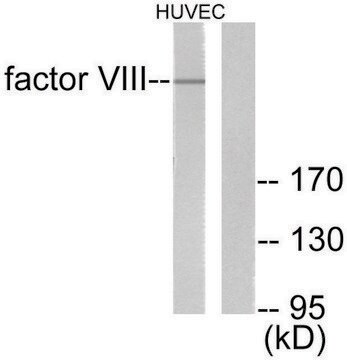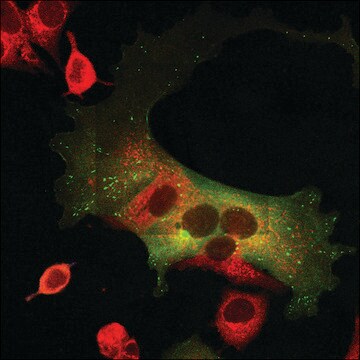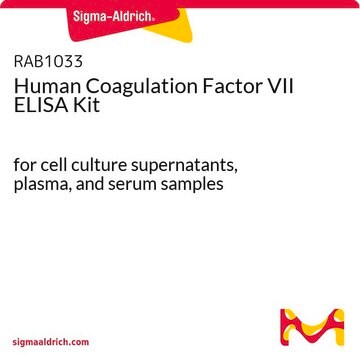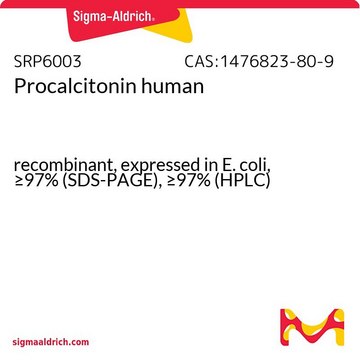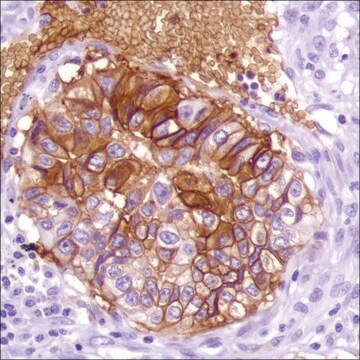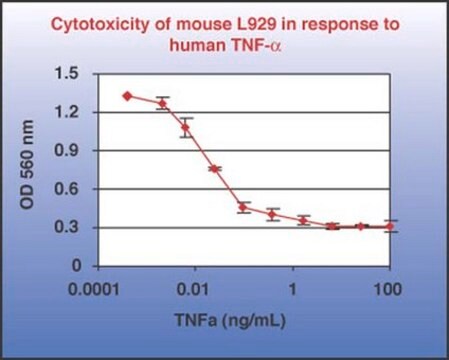F8146
Anti-Factor VII antibody, Mouse monoclonal
clone HVII-1, purified from hybridoma cell culture
Iniciar sesiónpara Ver la Fijación de precios por contrato y de la organización
About This Item
conjugado:
unconjugated
application:
ELISA (i)
WB
WB
clon:
HVII-1, monoclonal
reactividad de especies:
human
citations:
6
técnicas:
indirect ELISA: suitable
western blot: 1:4,000
western blot: 1:4,000
Productos recomendados
origen biológico
mouse
Nivel de calidad
conjugado
unconjugated
forma del anticuerpo
purified immunoglobulin
tipo de anticuerpo
primary antibodies
clon
HVII-1, monoclonal
Formulario
buffered aqueous solution
reactividad de especies
human
técnicas
indirect ELISA: suitable
western blot: 1:4,000
isotipo
IgG1
Nº de acceso UniProt
Condiciones de envío
dry ice
temp. de almacenamiento
−20°C
modificación del objetivo postraduccional
unmodified
Información sobre el gen
human ... F7(2155)
Categorías relacionadas
Descripción general
Anti-Factor VII antibody, mouse monoclonal (mouse) IgG1 isotype) is derived from the HVII-1 hybridoma produced by the fusion of mouse Sp2/0-Ag14 myeloma cells and splenocytes from immunized BAB/c mice. Human coagulation factor VII contains 10 gamma-carboxyglutamic acid residues (Gla), located at the N-terminal region of the molecule. The activated factor VII (factor VIIa) also consists of a light chain with the Gla-domain and an epidermal growth factor domain, which is linked by a disulfide bond to a heavy chain, containing the serine protease catalytic domain.
Especificidad
The antibody recognizes an epitope on the light chain of Factor VII in the presence or absence of divalent cations. Clone no. HVII-1 (also cited as clone no. MC1476/E.A.8.1) may be used for purification of Factor VII and for the preparation of Factor VII depleted human plasma.
Inmunógeno
Factor VII from pooled normal human plasma.
Aplicación
Anti-Factor VII antibody, Mouse monoclonal has been used in:
- the preparation of factor VII - depleted plasma and for purification
- sandwich-type immunoassays
- the evaluation of patients with hereditary factor VII deficiency by an enzyme linked immunosorbent assay (ELISA) or radio immunosorbent assay (RIA)
- the assay of factor VII level in patients with liver disease (a sensitive parameter of liver dysfunction)
- epidemiological studies of the importance of factor VII level as a risk factor for coronary heart disease, cerebrovascular disease and peripheral vascular diseases
- the determination of the activity state of factor VII in in vivo samples when used with a clotting assay
- flow cytometry
Applications in which this antibody has been used successfully, and the associated peer-reviewed papers, are given below.
Flow cytometry/Cell sorting (1 paper)
Flow cytometry/Cell sorting (1 paper)
Monoclonal Anti-Factor VII antibody is suitable for flow cytometry analysis to study the behavior of TF-fVIIa secreted by ovarian cancer cells was associated with microparticles (MPs). It is also suitable for western blot at a dilution of 1:4,000 and indirect ELISA.
Acciones bioquímicas o fisiológicas
Factor VII is a single-chain vitamin K-dependent glycoprotein in human coagulation. It has a molecular weight of ∼50,000Da, present in plasma in trace quantities. It is predominantly synthesized in liver and depends on the posttranslational γ−carboxylation of specific glutamic residues located near the NH2-terminus of the molecule. It is a serine protease zymogen and for activation it requires proteolytic cleavage in the disulfide-linked, two-chain form, Factor VIIa, by Factor Xa, Factor IXa, thrombin and Factor XIIa or β XIIa.
Forma física
Solution in 10 mM HEPES buffer, pH 7.4, with 140 mM sodium chloride and 0.05% sodium azide.
Cláusula de descargo de responsabilidad
Unless otherwise stated in our catalog or other company documentation accompanying the product(s), our products are intended for research use only and are not to be used for any other purpose, which includes but is not limited to, unauthorized commercial uses, in vitro diagnostic uses, ex vivo or in vivo therapeutic uses or any type of consumption or application to humans or animals.
¿No encuentra el producto adecuado?
Pruebe nuestro Herramienta de selección de productos.
Código de clase de almacenamiento
10 - Combustible liquids
Clase de riesgo para el agua (WGK)
nwg
Punto de inflamabilidad (°F)
Not applicable
Punto de inflamabilidad (°C)
Not applicable
Elija entre una de las versiones más recientes:
¿Ya tiene este producto?
Encuentre la documentación para los productos que ha comprado recientemente en la Biblioteca de documentos.
G J Broze et al.
The Journal of biological chemistry, 255(4), 1242-1247 (1980-02-25)
Blood coagulation Factor VII was purified 100,000-fold from fresh frozen human plasma to apparent homogeneity with a yield of 30% based on coagulation assay. The molecular weight estimated by sodium dodecyl sulfate-polyacrylamide gel electrophoresis was 48,000. Factor VII is composed
Regulated readthrough: A new method for the alternative tagging and targeting of recombinant proteins
Bouquin T, et al.
Journal of Biotechnology, 125(4), 516-528 (2006)
Thomas Bouquin et al.
Journal of biotechnology, 125(4), 516-528 (2006-05-10)
We report here a new method for the alternative peptide tagging of recombinant proteins from mammalian cell lines. This method, which we called regulated readthrough, exploits the property of aminoglycoside antibiotics to promote translational readthrough of nonsense codons. The basic
Structural biology of factor VIIa/tissue factor initiated coagulation
Vadivel K and Bajaj SP
Frontiers in Bioscience, 17, 2476-2476 (2012)
H Philippou et al.
Blood, 89(3), 767-775 (1997-02-01)
We report the development of an enzyme-linked immunosorbent assay (ELISA) that is specific for factor VIIa (FVIIa). This assay uses a neoantigen specific capture antibody directed to the amino acid peptide sequence N terminal to the FVII cleavage activation site.
Nuestro equipo de científicos tiene experiencia en todas las áreas de investigación: Ciencias de la vida, Ciencia de los materiales, Síntesis química, Cromatografía, Analítica y muchas otras.
Póngase en contacto con el Servicio técnico